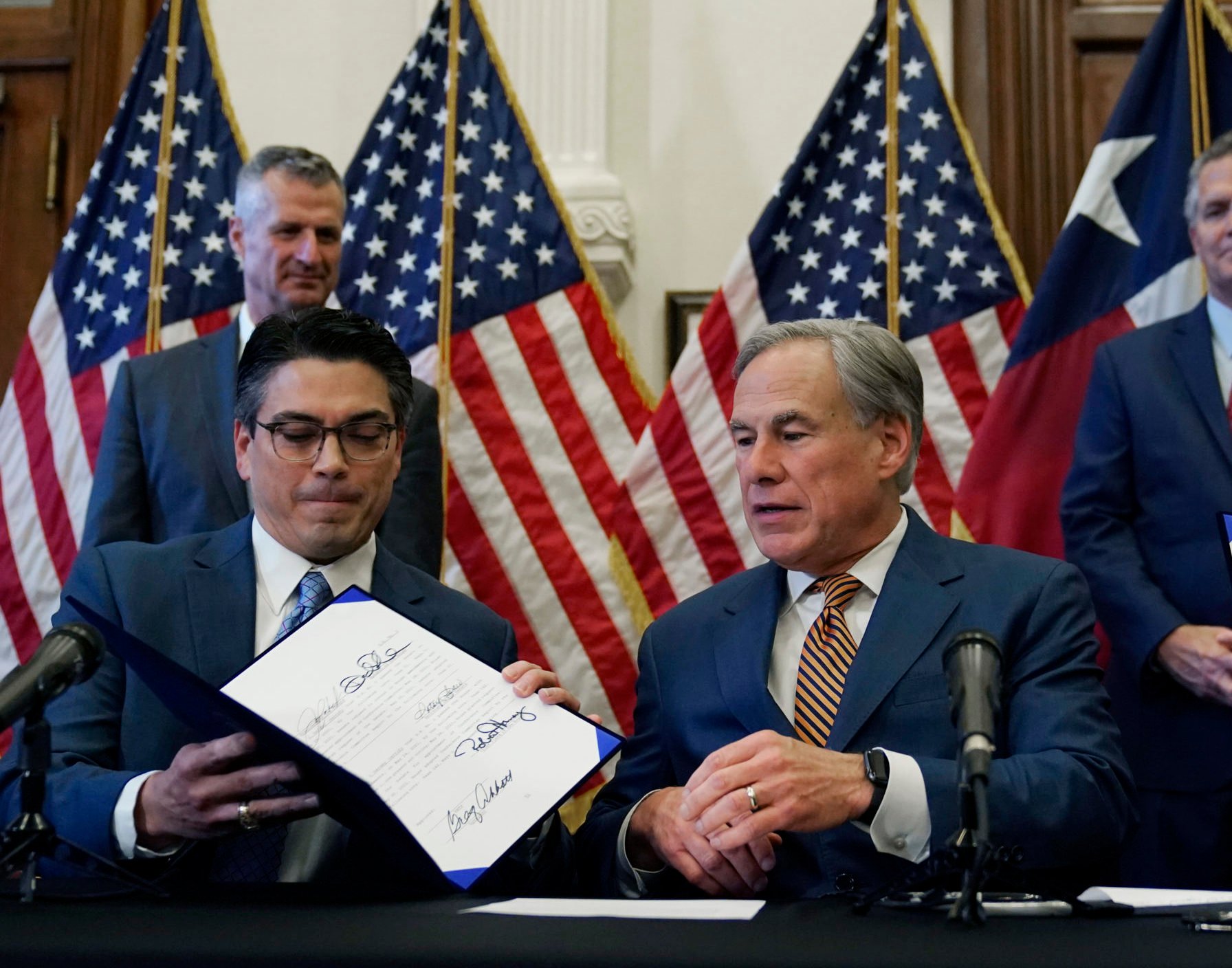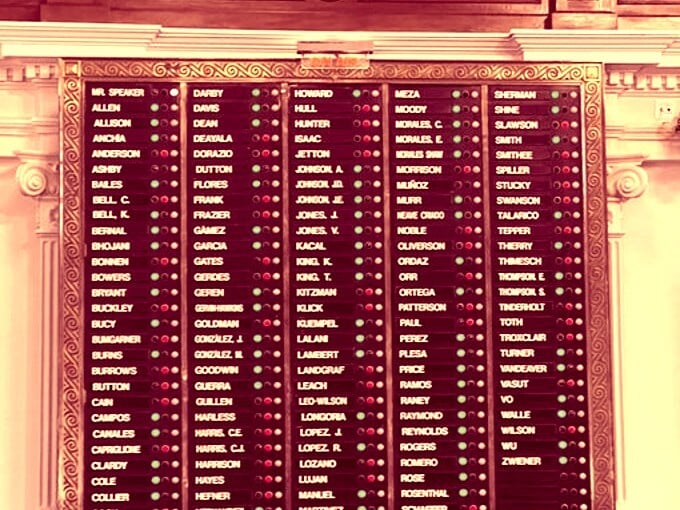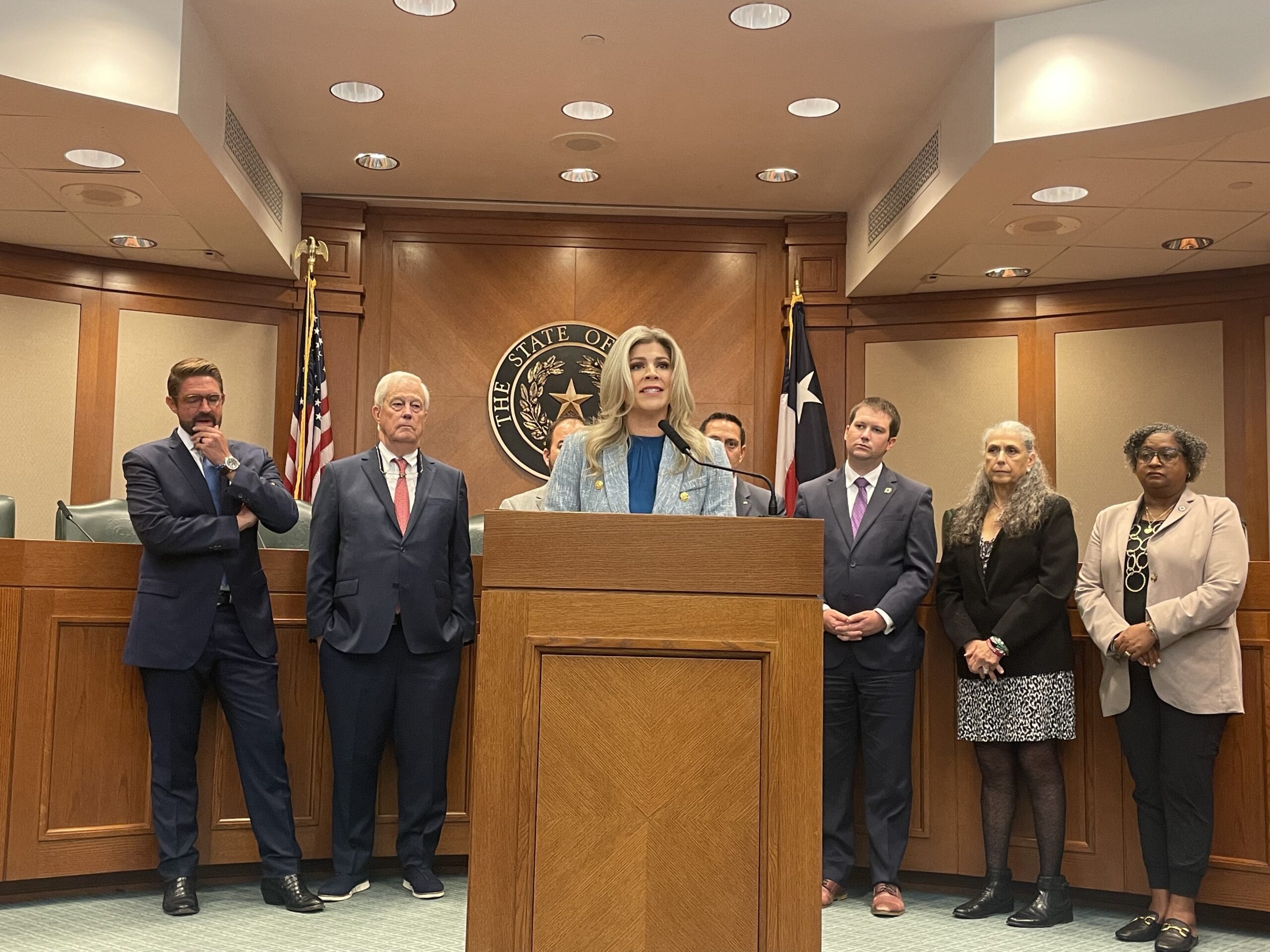
Ex-Legislator Faces Investigation for Possible Violation of Lobbying Law He Co-Sponsored
Chris Paddie is fighting back in court against a state ethics commission probe into his allegedly illegal lobbying.

A former legislator who chaired a powerful state House committee is under investigation by the Texas Ethics Commission (TEC) for his alleged violations of a Texas revolving-door law that restricts lawmakers from leaving office to become lobbyists.
The legislator under scrutiny is former Republican state Representative Chris Paddie, who resigned his East Texas seat in March 2022 to become a lobbyist and consultant for private sector interests. His departure came at the height of his power: As chairman of the House State Affairs Committee, Paddie played a central role in the state’s response to the deadly electric grid failure in 2021. But his attempted career transition, a common one in Austin, was thwarted by a 2019 lobbying law that Paddie himself had co-sponsored, which bans departing legislators who contributed campaign funds to fellow lawmakers from lobbying in Texas for two years after their last donation.
Before leaving office, Paddie made several campaign contributions to Republican House colleagues. In December 2022, Paddie registered as a lobbyist with the state and disclosed a list of clients—including Vistra, the state’s largest power company. As the Texas Observer reported then, Paddie claimed he’d come into compliance with the revolving-door law because he had personally reimbursed his campaign for the roughly $50,000 in contributions he’d made to other lawmakers.
He remained registered as a lobbyist until February 2023 when the TEC commissioners unanimously voted in favor of a legal opinion that Paddie was violating the law regardless of his personal reimbursement. “The Legislature was very clear that this was the behavior they were trying to prohibit and that there was no cure because the goodwill for the contribution, the benefit has already been received,” Randall Erben, the commission’s vice chair, said at the February meeting, according to the Houston Chronicle. Paddie terminated his registration the next day.
Now, the TEC is investigating Paddie’s activities both in that three-month period from 2022 to 2o23 and over a longer 33-month period to determine whether he did engage in illegal lobbying.
It’s a significant development for Paddie and the TEC, which is charged with enforcing the state’s notoriously weak ethics and lobbying laws. Rarely has the agency so aggressively pursued a politician for potential violations.
TEC is investigating all of “Paddie’s activities to prepare for or conduct lobbying activities that violated the two-year bar under the revolving-door lobby law,” the agency has said. If Paddie is found to have violated the law, the commission could potentially fine him for as much as three times the amount he was paid to lobby. In court filings, Paddie said his clients paid him about $130,000 in the three-month span he was registered to lobby.
TEC initially opened its investigation after it received a formal complaint in January 2023 that accused Paddie of violating the revolving door law. Months later, in September, TEC subpoenaed a vast swath of Paddie’s records and communications from the start of his final term in office in January 2021 to the present.
Specifically, the agency is asking for communications he had with future or potential clients while he was still in office and with his former legislative colleagues and other government officials after he left office and when he registered to lobby. TEC is also demanding Paddie provide any contracts or agreements he signed and invoices or payments he got from the clients he disclosed.
The subpoena also specifically asks for any documents related to meetings with House Speaker Dade Phelan or his staff, including one of Paddie’s former aides, and five other Republican legislators.
Paddie has argued that the TEC subpoena goes beyond the scope of the complaint that prompted the probe and that providing many of the requested records would violate state law that gives legislative privilege to lawmakers’ records and protects communications between private citizens (lobbyists included) and their legislators.
This disagreement has sparked a related court battle between the TEC, which accuses the former lawmaker of stonewalling its investigation, and Paddie, who claims the agency has gone beyond its enforcement authority.
Last November, Paddie asked a Travis County district court judge to quash or curtail the TEC subpoena, which Paddie argues is “intended to harass, annoy, and invade the personal, constitutional, and property rights” of himself and several third parties—including his clients.
TEC responded last month with its own motion to enforce the subpoena.
“After repeated attempts to confer, Paddie has now flatly refused to produce documents responsive to the subpoena that are plainly relevant to the Commission’s investigation,” TEC said in its filing, which was part of the Travis County court proceeding.
The initial court hearing on the motions was held Tuesday, though the judge made no decision.
“Mr. Paddie has not been an obstructionist in this case,” Ross Fischer, Paddie’s attorney, said at the hearing. “But he is, I think, rightly concerned that by covering 33 months, this [subpoena] goes beyond scope of complaint.”
Fischer is a prominent ethics and campaign finance lawyer in Texas and previously served as chairman of the Texas Ethics Commission. Paddie and Fischer did not respond to requests for comment. The TEC declined to comment.
In the course of the TEC investigation, Paddie provided a limited amount of records, including text messages and a list of meetings he had with lawmakers during the roughly three months that he was a registered lobbyist, according to documents filed with the county court. Paddie also provided invoices that show he was paid $130,000 for his services in those three months.
In response to TEC’s motion in court, Paddie’s lawyer said that “Paddie has provided sworn statements indicating that his registration as a lobbyist was gratuitous in that he was not actually required to register.” Under the state’s notoriously lax lobbying laws, individuals are only required to register as a lobbyist and disclose their clients if they’ve met certain thresholds—including spending over 40 hours a quarter trying to influence lawmakers and other officials.
Paddie says he never went over that threshold and therefore wasn’t technically a lobbyist and didn’t violate the law. TEC says the only way to assess this defense is for Paddie to provide all the records across the entire period of time that the agency is investigating.
“To the extent that whatever [evidence TEC gets] shows that he did have lobbying contacts, then I think that is going to be tough for Chris Paddie,” said Andrew Cates, a Texas ethics law attorney. “The other side of that is just because it’s lobbying doesn’t mean you’re technically a lobbyist.”
To determine that Paddie did violate the law, “What [TEC] would have to show is, honestly, that he’s lying,” Cates said.
On the day he registered as a lobbyist, December 7, Paddie had a call with aides to Governor Greg Abbott, according to an affidavit from Paddie. Records separately obtained by the Observer from the governor’s office also show the meeting was on the calendar for the governor’s chief of staff Gardner Pate and other advisors, including Jarred Shaffer, who was previously Paddie’s legislative aide. The records indicate that one of Paddie’s clients was also in attendance.
Paddie additionally met Speaker Phelan or his staff, along with several other Republican House members, while he was registered, according to the court records and the TEC subpoena. He further met with regulatory officials at the Texas Commission on Environmental Quality in February 2023.
In January and February 2023, Paddie disclosed spending over $1,800 on food and beverage for House members and their family.



